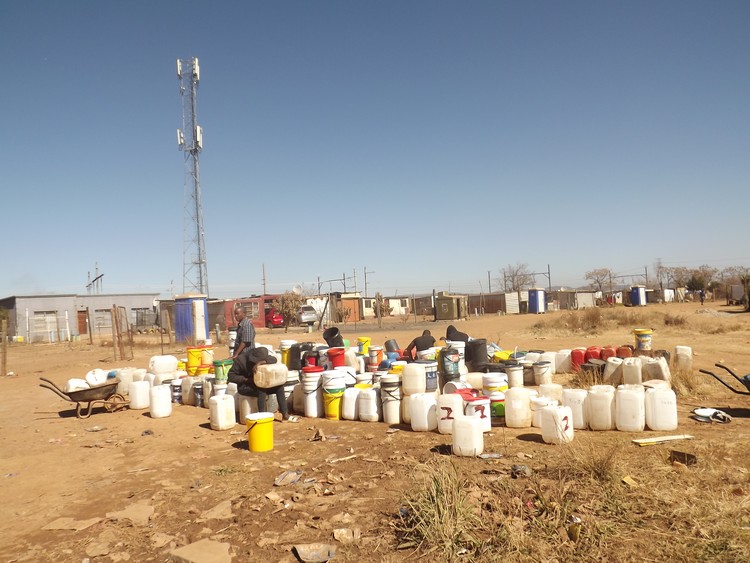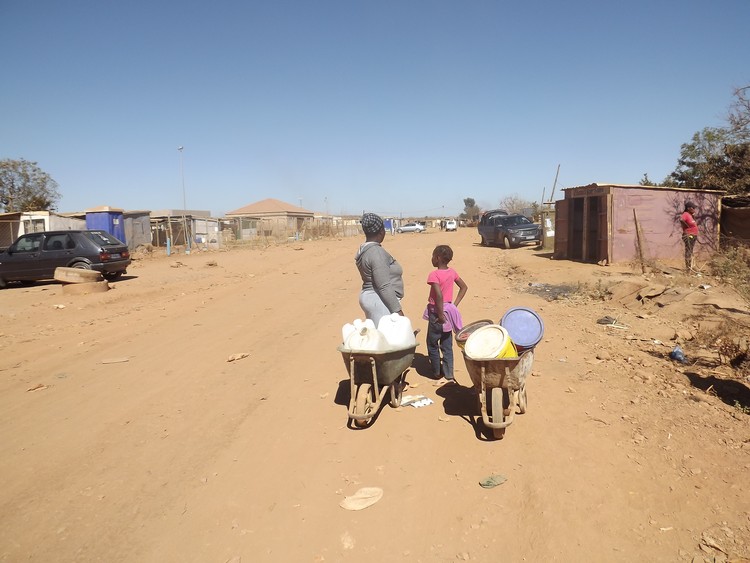The daily battle for water in Tshwane
“I feel very sorry for our old people and I wish the municipality could fix our taps”
Containers lined up to be filled from the water truck in Phomolong informal settlement in Tshwane. Photos: Warren Mabona
- Dozens of families queue daily at sites in Phomolong informal settlement, waiting for a water truck that often does not come.
- About half the households in the 1,000-household informal settlement in Mamelodi, Tshwane, have water taps. But the taps are mostly dry, residents say.
- The City of Tshwane says the water tankers go three times a day. But residents we spoke to say the tanker comes once a day to each site, and not every day.
- They say they haven’t had enough water since the beginning of the year.
Getting drinking water is a daily struggle for families in Phomolong informal settlement in Mamelodi, Tshwane, with long queues of people waiting with containers for the water tanker to come.
When GroundUp visited on 28 July 2024, men, women and children were patiently waiting at a local park with empty buckets and other containers. Another group of people were waiting on an open field on the other side of the settlement.
Several women had babies strapped to their backs despite the cold and wind.
According to the City of Tshwane, there are about 1,050 stands in Phomolong and more than half have taps in their yards. But residents say water only comes through the taps in the middle of the night. They say they have been battling to get water since the beginning of the year.
City spokesperson Lindela Mashigo said the City sends three tankers to Phomolong three times daily to provide water to residents. But people in the water queue told GroundUp that the City sends one water tanker to each site, and sometimes only once or twice a week.
“I have been waiting for water since 8am this morning,” said Mapule Masimula, who was sitting on the ground at the park breastfeeding her three-month-old baby.
“It was very cold when we arrived here. We warmed ourselves at an open fire. I’m worried that my baby will get sick because of the cold weather. I really need water to cook and wash school uniforms for my other two children.”
Another resident, Godfrey Mabaso, said he does not have a wheelbarrow but carries his buckets by hand.
“I have put eight buckets in this queue,” said Mabaso. “I wonder if the tanker will come. I also wonder if I will be able to fill all these buckets if it comes, because one tanker is not enough for all of us.”
Another resident, Linah Mailula, told GroundUp that many elderly people battle to get water from the tankers as everyone scuffles to fill their containers before the water runs out. “I feel very sorry for our old people and I wish the municipality could fix our taps,” said Mailula.
Some residents had given up queuing and were pushing wheelbarrows loaded with containers and walking to other sections of Mamelodi in the hope of finding a tanker elsewhere. “I think it is better to go elsewhere because one tanker is not enough for all of us,” said Khensani Baloyi. “We have been struggling like this since last year. The amount of water I will fetch at other sections will also not be enough. And pushing a wheelbarrow for a long distance is tiring.”
Mashigo said the provision of water was not demand driven. “It is dependent on the availability of budget too,” said Mashigo.
He said many parts of the city had not had water in late July because of infrastructure maintenance by Rand Water.
But GroundUp noted that residents of other areas in Mamelodi did have water in the taps in their yards. Mashigo said the residents of Phomolong were also affected by constant water supply disruptions due to illegal water connections at reservoirs. He said the City was attending to the illegal connection problem.
Mashigo said the City had allocated more than R28-million for the construction of water and sewage reticulation to the 1,051 stands in Phomolong. The contractor had started the work in January but had stopped in March because of land “invasions”. So far, 568 stands had taps and 502 stands had been connected to the sewage system. Toilets would be installed by another contractor, he said.
Meanwhile residents were using chemical toilets placed by the City on the streets.
Asked for details on the “invasions”, Mashigo referred us to the City’s head of Human Settlements, Sello Chipu.
Chipu told GroundUp: “The project stopped because there were people sitting on those stands and they needed to be relocated first. The City was aware there were people in those stands before the construction work started. But [we] thought they would soon be relocated to another land but that did not happen as there was no land. The acquisition of land is done by the Gauteng provincial department [of Human Settlements].”
Chipu said the City had recently concluded negotiations and people who had “invaded” the Phomolong stands would soon be relocated to Pienaarspoort.
Khensani Baloyi and her daughter make their way to another section of Mamelodi to look for water.
Support independent journalism
Donate using Payfast

Don't miss out on the latest news
We respect your privacy, and promise we won't spam you.
Next: QwaQwa 12-year-old wins international dance championship
Previous: Cape Town lawyer accused of race attack must answer to charges, says magistrate
© 2024 GroundUp. This article is licensed under a Creative Commons Attribution-NoDerivatives 4.0 International License.
You may republish this article, so long as you credit the authors and GroundUp, and do not change the text. Please include a link back to the original article.
We put an invisible pixel in the article so that we can count traffic to republishers. All analytics tools are solely on our servers. We do not give our logs to any third party. Logs are deleted after two weeks. We do not use any IP address identifying information except to count regional traffic. We are solely interested in counting hits, not tracking users. If you republish, please do not delete the invisible pixel.


